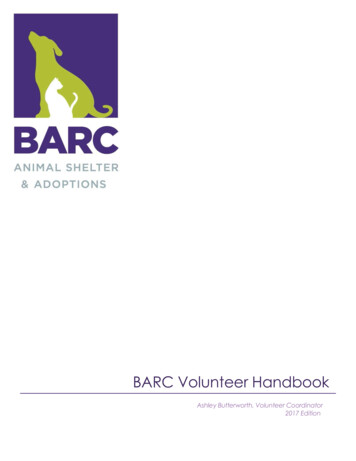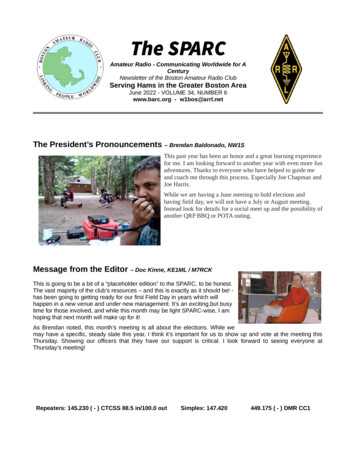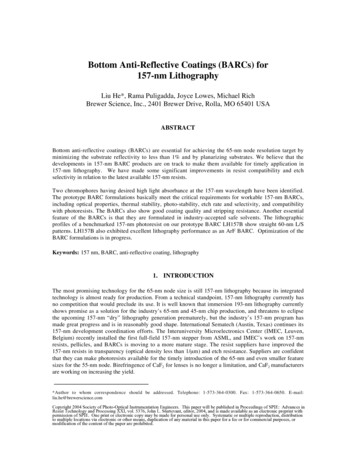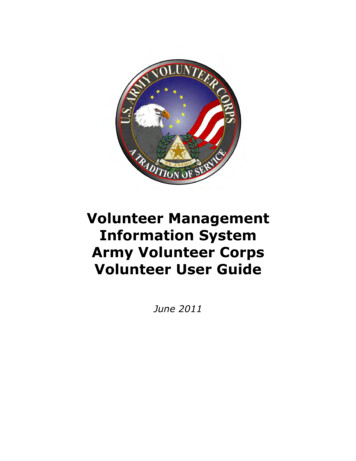
Transcription
BARC Volunteer HandbookAshley Butterworth, Volunteer Coordinator2017 Edition
Welcome!Welcome to the BARC Animal Shelter & Adoptions Volunteer Program. Being a volunteer is extremelyrewarding, educational and fun. You can have a significant positive impact on the lives of homelessanimals. Giving a puppy a bath, reading to cats, or getting your favorite L.O.S dog adopted will touch yourheart and keep you coming back for more. It’s especially rewarding to see how the animals respondimmediately to the love they receive while they are at the shelter.As a result of the volunteer program, dogs get walked regularly and cats are more socialized. Animals getplaced in foster homes when they are too young to adopt or need to recuperate from injury or illness; orjust need a little more socialization. Most importantly, because of volunteers, many dogs’ and cats’ livesare saved. The BARC Animal Shelter & Adoptions Volunteer Program was created for the animals.Thank You!Thank you for giving us your time and for giving the animals your attention! We appreciate yourcommitment to help us help them and we know that your time is valuable. Each of you may havedifferent reasons for wanting to be a volunteer, but all of you choose to volunteer at BARC because: Your desire to care for those cats and dogs desperately needing positive human interaction Your wish to help find homes for animals that deserve a second chance You want to be a part of making our community more responsible for our pets You want to help save livesAs a volunteer, you are a valuable asset to our organization and to the many animals which need lovinghomes. Our goal is to continually expand our community outreach program, placing more animals intogood homes. The time and energy you contribute by volunteering helps us achieve these goals.Since your support as a volunteer is extremely important, your decision to participate must be made withthe full understanding of the commitment and responsibility it demands. This handbook has been preparedfor you as a reference guide. It contains information regarding our policies & procedures, tools for workingwith the public and how to safely handle shelter animals. Please read it carefully so you will be wellequipped to answer questions knowledgeably and to provide quality care to the animals at the shelter.Thank you for giving your time and energy to the animals at BARC. We hope that the time you spend herewill be as rewarding to you as it is beneficial to the animals you help.
About BARCBARC is the City of Houston’s Animal Shelter and Adoption Facility. BARC is the only city shelter in Houstonrequired by law to accept every animal that comes through our doors regardless of breed, temperament,health conditions, and circumstance (from owner surrender, stray pickup, rescued or confiscated animals).We have built a best-in-class team that stewards our mission of professionalism, responsibility, compassion,commitment, integrity, and accountabilityBARC is dedicated to pet adoption and a live releaseinitiative. In addition to sheltering and providing veterinarycare to all animals brought to the shelter, we work diligentlyto place these animals in new homes. We collaborate andcoordinate with our Houston Pet Rescue groups and throughsocial media networks to cast the widest possible adoptionnet. We also provide intensive neo-natal and adult petfostering programs, along with hands-on volunteer trainingclasses and continuous workshops.We are committed to promoting responsible pet ownership through spaying/neutering, microchipping,vaccinations, and training class services. Campaigns and programs to educate and raise communityawareness about these services are ongoing.Houston has the largest urban land area in the U.S. Its size and unique characteristics create challengingcircumstances in regards to animal population and control. In addition to a year-long breeding seasonthat steadily increases the area’s animal population, our semi-tropical climate serves as an incubator forfleas, ticks and other parasites harmful to animals. Houston is an urban metropolis, but it is also home tovarious species of wild animals and reptiles including coyotes, bobcats, bats, raccoons, opossums, skunks,foxes, snakes and even alligators. Because of this, rabies outbreaks are a special concern. A rabiesvaccination is required to license your pet, and a pet license is mandatory in Houston. BARC serves as thelicensing facility. We work hard to educate the public about rabies prevention and about co-existing withour extensive wildlife population.Our goal is to provide animal control and care services that minimize fear, pain, stress and suffering toanimals in and out of the shelter and we work to ensure safe and healthy human-animal interactions. Wework closely with the City of Houston Police Department and Houston Animal Control to respond to animalcruelty and abuse reports, behavioral complaints, dog bite cases and animal/gang related issues.
What does BARC do?Placement of Pets through Adoptions & Rescue Groups We make dogs and cats available for adoption at our shelter and at various off-site adoptionevents throughout the city. Animals are transferred to registered rescue groups for free! Standard Adoption FeesoDogs - 50Puppies (4 months and under) - 75oCats - 20Kittens (4 months and under) - 20Lost and Found People who have lost pets should be encouraged to come to BARC Animal Shelter &Adoptions and look through the stray kennels which contain hundreds of animals. If BARC picks up an animal with an ID tag or microchip, BARC staff will call the owner orcontact the agency that issued the rabies tag in order to get the pet back to its homePet Licensing – the law in Houston A pet license identifies and protects your pet in case it becomes lost. Even indoor pets can get outand become lost. The City of Houston Municipal Code requires that anyone owning a dog or catfour months of age or older must have his or her pet licensed and vaccinated against rabies everyyear. You are required to renew your license yearly and keep updated.Rabies Prevention Call 311 to report possible exposure including bites and scratches from unvaccinated animals. Animals that have bitten or scratched need to be quarantined for public safety.Animal Cruelty Citizens must report acts of cruelty and neglect. Cruelty to an innocent animal is often atraining ground for child abuse or domestic cruelty and they can occur hand in hand. The basic needs of an animal require that they have access to food, water, shelter and exercise. Ifthe dog or cat is deprived of these, 311 will create a formal report and an Animal Control Officerwill investigate.Owner Surrender Some owners cannot or choose not to fulfill the commitment they made when they brought ananimal into their home. We try to inform owners of all the alternatives to surrendering their pet sothey can make a decision that’s best for the animal. Owner surrenders are accepted at the shelter every day from 12-5:30 pm except for Mondays &Thursdays. All owner surrenders must be brought to our facility located at 3200 Carr Street,Houston, TX 77026.
Volunteering at BARCWho can volunteer at BARC?Volunteers must be 13 years of age or older. Volunteers 13-15 years old must volunteer with a parent orguardian at all times. 16 and 17 year olds can volunteer on their own after attending orientation with aparent or guardian. No minor can volunteer with or handle adult dogs.What can you do for BARC?On the following pages, you’ll see a variety of job descriptions. Look through them, and then talk to theVolunteer Coordinator who will help you to decide where you are needed most based on yourbackground and your interests.We are looking for committed volunteers who can participate in BARC activities at least once a month ifpossible. While not required, regular participation helps the animals at BARC and keeps you connectedwith the rest of the BARC team.If you can’t come in at regularly scheduled times, there are other ways you can volunteer. Wealways need help with special events and donation drives. Be sure to check your email for upcomingevents and opportunities to get involved at BARC.Process to Volunteer at BARC:1. Register Online at ionGUID 0af131a9- a6824f05-b006-d11538ee08bd&signupFormId 1 The link listed here directs you to the BARC setupportal on the www.MyVolunteerPage.com website. Fill out the profile information to completethe initial registration as a volunteer. After creating your account, you can quickly log into youraccount via www.MyVolunteerPage.com.2. Sign Up for Orientation through the volunteer server, on the link listed above, sign up to attend aninitial on-site BARC Volunteer Orientation. Currently, the class is offered four times a month. Theclass lasts 3 hours and includes a classroom presentation, shelter tour and an hour of mandatoryhands-on volunteer time. This class is a pre-requisite to performing any of the volunteer activitiesoffered. Volunteers must wear long pants and closed-toed shoes to volunteer with BARC to preventinjury. Use the gate at 2700 Evella Street to enter the facility and proceed to the BARC Classroom, inthe admin building, for the orientation.3. Sign Up for Volunteer Activities. Assignments for a variety of volunteer duties are posted on thevolunteer web page (www.MyVolunteerPage.com) and you are able to schedule yourself for variousactivities and shifts that fit your lifestyle and schedule. Once you have completed the initialvolunteer orientation, log in to the volunteer server and self-schedule yourself for any and allactivities, orientations, or tasks you are interested in participating in for BARC – these can be on-site oroff-site.
Scheduling Your ServiceDaily Closing TimeAll volunteers must be off the BARC property no later than 5:30 pm each day, and will not be allowed onpremise earlier than 9:00 am for scheduled volunteer activities, assigned through the on-line volunteerscheduling system.Log Your Volunteer Service HoursLog your volunteer hours on www.MyVolunteerPage.com after completing your volunteer serviceassignments. Logging time is important for the shelter for grant purposes, community support, and programdevelopment as well as volunteer appreciation. The hour log can also be used to submit to schools,businesses and organizations for proof of completion of required volunteer service hours.Missing ShiftsYour support matters – the animals and the BARC team are counting on you. Therefore, missing volunteershifts is unacceptable. Missing volunteer assigned shifts leaves spots available that could have otherwisebeen staffed by other volunteers. You can change your volunteer assignment on-line 24 hours prior to theassignment date and time, if you find that you are unable to fulfill a previously scheduled activity. If you areunable to remove/change your assignment online, you must contact the Volunteer Coordinator as soon aspossible. Missing 3 or more assigned shifts without notification will result in your removal from the BARCVolunteer program.Contact InformationIt is important to keep your contact information up to date at all times. Therefore, volunteers should notifythe Volunteer Coordinator of changes in address, phone number, emergency contact or email address in atimely manner.
Code of ConductRespectful BehaviorAs a member of the BARC team, you are a representative of BARC’s brand and image and are expectedto conduct yourself in a professional manner. You must be respectful and courteous in your interactionswith the public and with staff. Disrespectful or unprofessional behavior, sexual harassment, threats,disparaging remarks, discrimination or vulgar language will not be tolerated and you may be asked tocease your volunteer work as a result of such conduct. This code of conduct applies to online and/orwritten material as well as personal interactions with staff, other volunteers, and members of the public.Bottom line - commit to providing excellent customer service to our visitors, staff, and fellow volunteers.Non-BARC Guests/PetsIt is not appropriate to bring children who are not registered BARC volunteers or your own pets to the facilitywhile you are performing volunteer activities. All BARC volunteers must first register online, complete theinitial volunteer orientation, sign the volunteer agreement, and have approval from the VolunteerCoordinator to proceed with further activities.Privacy Policy & Conveying Correct InformationInformation pertaining to BARC records or specific cases is strictly confidential and may not be discussedwith others. Please refrain from offering the public information on fees or policies unless you are sure youhave current, accurate information. When in doubt, always refer the person to BARC staff. Volunteers arenot to disclose any confidential information (contact, personal information, financial, etc.) of sheltercustomers or staff members. Only BARC approved signage and messaging are allowed on premise, atBARC events or online. Do not write notes or messages on kennel cards, on paper signs or affix any othersigns or messages without prior approval from BARC management.
Dress CodeCome prepared with the mindset that anything that you wear will get dirty. When working with animalsyou’re advised to cover as much skin as possible to avoid scratches, exposure to zoonotic communicableillness, ringworm, mange (scabies), fleas and/or ticks. As a BARC volunteer, you are required to wear thefollowing during each volunteer activity for BARC: BARC Volunteer ID badge – this will be assigned to you once you have completed the Volunteerorientation and show up for your first shift. One time volunteers will not receive BARC shirts orbadges, but should wear appropriate clothing – long pants, comfortable, closed-toe shoes(preferably tennis shoes) and a comfortable shirt. BARC volunteer shirt it is imperative that all volunteers be dressed in BARC apparel so that they areconsistently recognizable to the public. Only BARC shirts are to be worn by volunteers while onscheduled activities. Long pants are required – jeans, khakis or other long pants, no shorts, skirts, skorts, or othergarments that expose portions of the leg to potential scratches or scrapes. Comfortable close-toed shoes – no sandals or flip flops.ParkingThe front entrance at 3200 Carr Street is for public guests only. All volunteers will use the 2700 Evella Streetentrance and park behind the South Dog Adoption Building or Cat Adoption Building. When entering the2700 Evella entrance, be prepared to show your BARC volunteer badge or valid identification (if you havenot yet received a badge). Do not block fire lanes or park in unmarked areas – park in designated areasonly. When parking behind South building by the warehouses please do not park in numbered spots asthose are reserved for large ACO vehicles. Cars parked in fire lanes or unmarked areas may be towed atthe owner’s expense.SmokingSmoking is prohibited in all buildings and facility grounds. Volunteers who wish to smoke must do so off ofCity property (outside the gates). While working at off-site events as a BARC Volunteer, you may notsmoke except when on breaks and out of public view.
Drugs and AlcoholUnder no circumstances shall a Volunteer work at our facility or off-site event under the influence of drugsor alcohol. If suspected of being under the influence of drugs and/or alcohol, you will be asked to leaveimmediately and will be subject to termination from the BARC Volunteer Program.Cell PhonesWhile you are here, we want you to keep your focus on the animals in your care and the customers in needof assistance. BARC discourages the use of cell phones and mobile devices that create unsafe situationsand we don’t want your phones damaged by water when bathing animals or from being dropped.Volunteers are prohibited from using their cell phones while interacting with BARC customers. If it isnecessary for you to have your cell phone with you while volunteering, set the ringer to vibrate or silent, anduse your cell phone in non-working areas only. Ear buds, headsets, and headphones shall not be used atany time while volunteering with BARC. Use of cell phones while working with the public may result incorrective action.Animal CareIt is expected that BARC Volunteers will treat all animals in the shelter’s care with compassion and gentleness.Ask for assistance from BARC staff when needed, and use caution at all times. When handling an animal,volunteers must always have the appropriate kennel card with them for that animal. Do not hand writemessages on kennel cards – notify BARC staff of any observations or information you feel may need to benoted for an animal. Volunteers are not to diagnose medical cases, remove sick animals from the shelterwithout permission from the director, or take any animals from the shelter without proper documentation andapproval from the front counter or foster/rescue office. Any volunteer doing so will be subject to dismissal.InjuryYou are responsible for your own health and welfare, so be sure to mind all signs and safety precautions.If you are injured while at BARC, you must notify the Volunteer Coordinator or Manager on Dutyimmediately.ComplaintsYour point of contact regarding volunteering or shelter activities is the Volunteer Coordinator. Bring yourconcerns and questions to them first. If you have a complaint regarding a staff member or an issue withBARC policy, immediately bring it to the attention of the Volunteer Coordinator so it can be resolved. Ifyou are not satisfied with the resolution, you may take your complaint to the Manager on Duty for BARCAnimal Shelter & Adoptions and you may appeal any issues directly to Greg Damianoff, Director for BARC.If you have difficulties working with other volunteers or staff members, bring the situation to the attention ofthe Volunteer Coordinator or Manager on Duty as soon as possible. We want to resolve issues so that wecan all work effectively as a team. Immediately report anything you interpret as harassment from staff,volunteers or the public to the Volunteer Coordinator or Manager on Duty to ensure your safety and thesafety of everyone on the premises.
DisciplineOverviewThe purpose of the disciplinary policy and procedure is to set and maintain standards of conductwithin BARC, and in doing so, ensure that all volunteers are treated fairly and consistently. It isdesigned to help and encourage all volunteers to achieve and maintain satisfactory standards ofconduct. Where deemed appropriate, disciplinary measures may be taken when volunteers behavein a way that detracts from our ability to deliver a quality service to our customers, contradicts ourcode of conduct or in any other way perceived to adversely affect our company, objectives orreputation.This policy establishes an equitable and consistent approach to violations of BARC’s code ofconduct by: ensuring the counselling takes place to reinforce the expected performance or conductstandards establishing a process under which warnings may be issued and discussed providing fordisciplinary action where performance or conduct does not improveThree Strike/ At Will PolicyAll volunteers covered by this Handbook serve at the pleasure of BARC and are considered "at will.” Insuch an "at will" volunteer relationship, either the volunteer or volunteer coordinator may terminate thevolunteer relationship at any time without notice. Each party will endeavor to give the other notice, but itis not required. Depending on the severity of the infraction, BARC can choose to take the necessarysteps in its “three strike” policy. BARC can choose to bypass any of these steps at any time in thedisciplinary procedure if BARC deems it necessary. Please see below for each step in BARC’s “threestrike” policy:1. First or formal verbal warningIf conduct or performance is unsatisfactory, the volunteer will be given a written warning orperformance note. Such warnings will be recorded but disregarded after three months ofsatisfactory service, providing there have been no subsequent disciplinary issues.2. Written warningIf the conduct is regarded as more serious or the volunteers work or conduct is consideredunsatisfactory after they have received a formal verbal warning, a disciplinary meeting maybe called.After a period of 6 months, if no further disciplinary action has been found necessaryand the breach has been resolved, the warning will expire.3. TerminationIf the volunteer’s work or conduct fails to improve, or where the allegation is particularlyserious, the volunteer coordinator will give you a verbal notice of dismissal from yourvolunteer duties.
Working with BARCMedia RelationsVolunteers are specifically prohibited from speaking on behalf of BARC Animal Shelter & Adoptions anyrepresentative of the media. All media questions are handled by Ashytn RivetAshtyn.Rivet@hosutontx.govAuthorized AreasVolunteers, Fosters and Rescue Partners are permitted to access the public areas of BARC at any time.Admittance is prohibited to restricted areas such as the back half of the domed Hold/Evaluation building,including but not limited to the wards, quarantine, and intake; the restricted areas of the Dog Adoptionbuilding, including but not limited to the puppy room, storage rooms, and Animal Care Technician or otherstaff work rooms; the Cat Building including but not limited to designated employee only areas. Somevolunteer activities may include access to restricted areas, but only for the described volunteer activityduring the assigned time period only. At no time are any volunteers, fosters or rescues to walk through orspend time in unauthorized areas, unless they are escorted at all times by a BARC staff member.EuthanasiaEuthanasia is an unfortunate occurrence at BARC Animal Shelter & Adoptions. It is always our last optionand we always strive to place an animal into a good home if available. We hope that more Houstonianswill visit BARC and adopt than those who come to BARC to turn-in animals. We also hope that throughspay/neuter efforts and humane education; there will be far fewer cats and dogs needing homes.As a volunteer for BARC, you may be exposed to animals facing euthanasia, even though you will neverhave to witness it. BARC uses a humane sodium pentobarbital solution injected intravenously. Whether or notyou personally agree with the practice, this is a day-to-day reality at the shelter. Our staff has to deal with itsadministration and its after-effects on a daily basis.If you are not comfortable in this atmosphere, supporting BARC as it strives to make Houston a morehumane community, this may not be a positive volunteer experience for you. You may be better suitedto volunteering at another worthy animal shelter or agency in the area.Disease ControlBARC Animal Shelter & Adoptions is responsible for ensuring public safety including rabies control and otherzoonotic disease containment. As a volunteer at BARC, you must be sure to wash your hands frequently aswell as clean all animal handling equipment thoroughly to prevent the spread of disease in the shelter.If you are bitten or scratched, you must report the incident to Bite Case and the Volunteer Coordinator.Be sure to have the identity (record number or animal ID) of the animal ready. The animal may bequarantined for observation. You are responsible for your own personal health and are advised to seekmedical treatment from your doctor.
Community Groups & EventsActivities & EventsBARC schedules and plans activities and events (on-site as well as off-site) for adoptions, awareness andother outreach initiatives several months in advance. As such, BARC has established protocols,procedures, branding standards and assigned resources. Any and all activities and events, either on theBARC premises or as represented as BARC in the public must be coordinated, and approved by BARCmanagement at least 45 days in advance. Unscheduled or impromptu activities or events will not besupported or endorsed by BARC.Volunteer Groups or OrganizationsAny groups or organizations wishing to hold an event or group volunteer project must contact theVolunteer Coordinator in advance to make such arrangements. Groups will not be allowed to assembleat an event or on-site and promote their business, cause or messaging without prior approval from BARCManagement.Rescue GroupsWhile we hope we can find homes for all the animals that come into the shelter, in reality, we receive manymore than we have people who want to adopt. That’s where rescue groups come in.Rescue groups are organized 501(c)3 groups that transfer animals from the shelter into their program tocare for and place the animal into a permanent home. BARC currently partners with over 130rescue groups in the Houston area.All rescue groups that wish to transfer an animal from BARC must complete a Rescue Group Applicationand be approved by the Rescue Coordinator via BARC.Aid@houstontx.gov. There is no charge toregistered rescue groups to transfer animals from our facility into their care. All transfer requests arehandled through BARC.Aid@houstontx.gov, which is monitored 7 days a week from 9am-5pm.
Volunteer ActivitiesAdoptions HostAssist the public at the shelter and offsite locations with questions and help facilitate introductions betweenpotential adopters and animals.Adoption CounselorReview applications from potential adopters and conduct an interview to determine a good fit. Additionaltraining is required for this activity.Reading to PawsReading to Paws is a program where volunteers will read to animals and interact with them in a calmenvironment. This activity is help prepare animals for their future homes and lets them come out of their kennelsin a more “normal” setting.Cat Castle AssistantIn the cat castle, volunteers will be assisting staff with their daily routines such as cleaning kennels, preppingmeet and greet rooms, and making enrichment items. Volunteers will also be socializing cats by readingwith them, petting them, or playing with toys.Dog WalkingVolunteers will take dogs from their kennels and bring them for walks around the BARC campus. They canalso utilize designated dog runs to let dogs off leash to play or have a potty break.Puppy Nursery AssistantVolunteers will assist staff with prepping the puppy nursery for the day. They will also assist the potential adopterswith puppy interactions.Photographer/Photographer’s AssistantThe photography team works together to photograph all of our animals in the facility. Assistants will helpbring animals from their kennels to the photographer.Offsite EventsVolunteers will go to select offsite adoption locations and help the public with any questions they have analso help facilitate meet and greets between animals.Surgery/ Vet Staff AssistantHelp the surgery team prep tools and animals for surgeryCommunity Outreach (block walking / Healthy Pets healthy streets)A team assembles with staff to walk to educate and enhance the community’s awareness of responsiblepet ownership and promote spay and neuter initiatives.
Community SupportDonationsWe are not a private, non-profit organization and have a very limited budget as part of the citygovernment that is supported by our citizens’ tax dollars. We have a responsibility to all the citizens to useour funds as wisely as we can.Donations may be brought to the security shack at 2700 Evella St, anytime from 9-5:30 pm every day.Large donations (too heavy, bulky, or numerous) should be scheduled through the volunteer coordinator.Email barcvolunteers@houstontx.gov to make arrangements to offload them using the rear gate. You mayalso bring donations with you when you are scheduled to volunteer.All supplies donated must be unexpired and unopened to be usable. BARC is always in need of thefollowing items Dawn dishwashing liquidFlea ShampooSmall hand towelsNewspapersKong toys and other sturdy, washable dog toysWand-type, interactive cat toysWashable, plastic, ball-type cat toysNatural rawhide chewsHE (high efficiency) liquid laundry detergentDryer sheetsTough, empty plastic bottles such asGatorade or bleach bottlesUnopened, unexpired peanut butterTennis ballsAir freshenerPaper bagsCardboard boxesFabric softenerNew unopened toothbrushesNewspapersNew, unopened rubbing alcoholNew unopened hydrogen peroxideConstruction paperMarkers – sharpies, washable, etc.Plastic Storage BinsWebcams
Kitten and puppy nursing bottlesKitten Milk Replacer (KMR)Puppy Milk Replacer (Esbilac)Canned and dry cat and dog foodCanned and dry kitten and puppy foodNatural dog and cat treatsAdvantage flea and tick medicineCapstar flea and tick medicineLitter and litter boxesLeashes and collarsNail grooming equipmentDog & Cat BrushesBenchesA-frame LaddersLarge containers for plantsPooper-scoopers
BARC is the City of Houston's Animal Shelter and Adoption Facility. BARC is the only city shelter in Houston required by law to accept every animal that comes through our doors regardless of breed, temperament, health conditions, and circumstance (from owner surrender, stray pickup, rescued or confiscated animals). .










